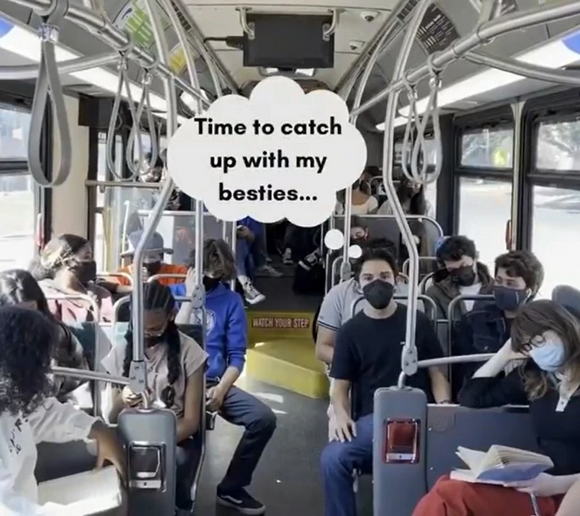Back at the start of October, Metro and LAUSD leaders celebrated the start of Metro's fareless transit pilot - sometimes called FSI for Fareless System Initiative. Students get to ride L.A. buses and trains for free through June 2023.
As Streetsblog reported at the time, some caveats were in order. Free rides apply to only participating school districts and only on participating transit lines (L.A. County's biggies - LAUSD and Metro - are participating). Students could not use their existing student pass TAP cards, but had to wait for new TAP "GoPass" cards to be distributed.
Back in October, it didn't seem all that urgent to get the program up and running quickly, because surely students would have new cards in hand when Metro resumed fare collection on January 10, 2022. (Metro buses have been effectively fareless under COVID, though riding Metro rail does require fare payment.)
My daughter occasionally rides the bus to her central L.A. LAUSD elementary school. She finally received her new fareless TAP card last week - the day before winter break - two and a half months after the start of the Metro/LAUSD pilot. Streetsblog L.A. founder Damien Newton's kids have yet to receive new TAP cards via their Westside LAUSD elementary school.
Streetsblog asked around to try to find out what is causing the delays in getting the fareless pilot up and running.
An LAUSD spokesperson told Streetsblog that, "due to supply chain issues, Metro has been sending weekly shipments of TAP cards to Los Angeles Unified. To date, we have received just over 300,000 cards." LAUSD has 600,000 students.
LAUSD first prioritized distribution to high school students, then middle school students, then third to fifth graders, then kindergarteners to second graders. They have also prioritized students experiencing homelessness and provided cards to students who request them via their Community of Schools office (though, as an LAUSD parent, I couldn't actually tell you what that is - and wouldn't know to go beyond inquiring at the front office at my daughter's school).
LAUSD's representative stated that students who have not yet received a TAP card can expect to receive one within the next one to two months at their school.
Metro is working on a faster alternative for students who already have TAP cards. Prior to the current FSI pilot, students needed a special TAP card to be eligible for Metro's student fares ($1 per ride, instead of the usual $1.75). I have written about the somewhat cumbersome process to get those cards - which has resulted in most students not actually having one. Metro is in the process of generating registration codes that will allow students to add GoPass to existing TAP cards. This would have been great for my daughter two months ago - and should ease some of the stated supply chain issues.
As of last week, according to Metro spokesperson Dave Sotero, the new registration codes "just became available" but LAUSD hasn't received them yet.
On the bright side, Culver City Bus offers an example of where the student fareless pilot is working well. CCBus was part of Metro's smaller, early fareless mini-pilot prior to the Metro board's September approval of the current countywide pilot. Culver City Management Analyst Dia Turner told Streetsblog that they reached an agreement with Metro in July, and were able to roll the program out at the start of the Culver City Unified School District (enrollment 7,000) school year in mid-August. CCBus had already resumed collecting fares (in September 2020), so bus-riding students had a fiscal motivation to take advantage of the program.
CCBus created a program logo and ran a promotional campaign aimed at getting the word out to students and parents, and also made sure school staff were aware of the new program. Check out the campaign's website and video.
Turner reported that CCBus and CCUSD have distributed nearly 1,500 GoPass TAP cards to students. Of those, 840 have been registered/activated - mostly high school students (525), with some Middle (220) and Elementary (95). GoPass riders have used their new TAP cars for 13,657 fareless CCBus trips - accounting for 23 percent of overall CCBus trips in the past month. Turner says that "Ridership is up. Complaints are down." and that, "We have had a steady stream of TAP card requests from the Middle School and High School since the program began."
CCBus is planning further program promotion as students return to school in January.
Even with a difficult roll-out - and a program that falls well short of transit advocates push for universal fare-free transit - Metro and its transit agency and school district partners are providing much needed free trips to many students through L.A. County. The program appears poised to continue to gain momentum in the year ahead.






